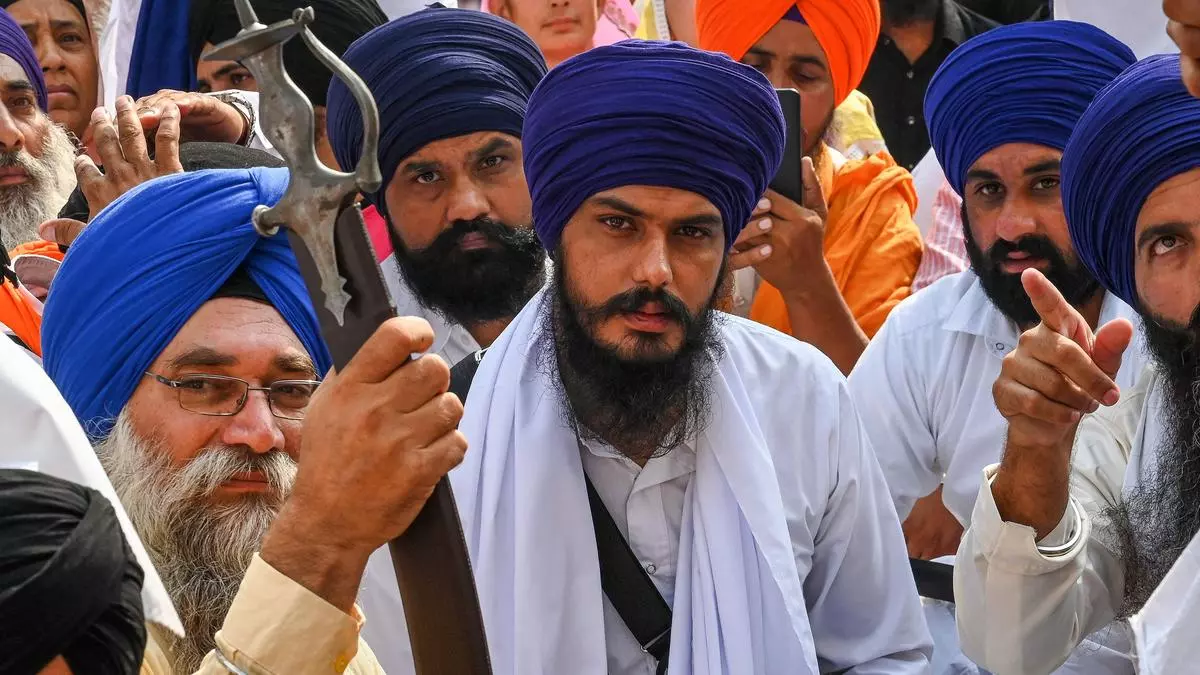NEW DELHI: Two out of three prominent Sikh radicals running in the Lok Sabha elections had secured victories. Amritpal Singh, a jailed Sikh hardliner, won the Khadoor Sahib seat as an independent defeating Congress candidate Kulbir Singh Zira by nearly 200,000 votes, the largest margin in Punjab this election.
While in Faridkot, Sarabjeet Singh Khalsa, son of Beant Singh, one of the assassins of former Prime Minister Indira Gandhi, won as an independent defeating the Aam Aadmi Party’s Karamjit Singh Anmol by 70,053 votes. However, Simranjit Singh Mann, another hardliner, lost his seat in Sangrur to the Aam Aadmi Party’s Gurmeet Singh Meet Hayer, who won with a significant lead of 170,000 votes over his closest competitor, Congress’s Sukhpal Singh Khaira. Mann, the president of Shiromani Akali Dal (Amritsar), finished in third place.
Amritpal Singh has been held in Dibrugarh jail in Assam for over a year under the National Security Act (NSA) for activities deemed “prejudicial to the security of India and the maintenance of public order.” Sarabjeet Singh Khalsa, a resident of Mohali and son of former Prime Minister Indira Gandhi’s assassin Beant Singh, had previously run unsuccessfully in three elections: in 2004 and 2007 on a Shiromani Akali Dal (Amritsar) ticket and in 2014 on a Bahujan Samaj Party ticket. His family has a history of electoral success. In 1989, his mother Bimal Kaur Khalsa won the Lok Sabha seat from Ropar, and his grandfather Sucha Singh won the Bathinda seat, both on Shiromani Akali Dal (Amritsar) tickets.
Professor Ashutosh Kumar from
Amritpal Singh, a self-styled preacher and advocate for Sikh separatism, gained prominence in Punjab after being appointed as the leader of ‘Waris Punjab De’ in September 2022. His organisation was initially part of a larger movement against agricultural reforms but he soon began leading marches and advocating for the rights of Sikhs and the creation of an independent Sikh homeland, Khalistan. Before his arrest, Amritpal Singh was involved in several high-profile incidents that increased his visibility. He was known for his radical speeches and had been leading protests calling for the protection of Sikh rights. His actions included storming a police station with supporters to demand the release of an associate, which led to clashes with the police. This incident, among others, contributed to his notoriety and eventual arrest.
Professor Ashutosh asserted, Initially, Amritpal was an ordinary person, and all of a sudden he changed his looks, grew beards, and started wearing turban, mimicking Bhindranwale in looks. Punjab, with its troubled history and proximity to volatile borders, faces unique challenges. The state’s small size and geopolitical significance, especially with neighbouring Pakistan and the recent tensions with China, exacerbate these issues. There are numerous external forces waiting to exploit any opportunity, making the current trends particularly alarming.
Speaking on the dynamics of Punjab Prof. Ashutosh said Simranjit Singh Mann, once a powerful leader, lost his influence over time but still managed to secure significant votes. The political class in Punjab has failed to address the underlying issues, contributing to the rise of such candidates. He further said that Sarabjeet Singh has previously lost elections, but this time his candidature came suddenly out of nowhere. Khalsa’s lack of significant political accomplishments makes his victory even more unexpected. His only notable association is with his father’s legacy as an assassinator. Former PM Indira Gandhi still recounts him as a martyr in Punjab. The decline of established political parties and the rise of radical elements signal a troubling shift. This decline is bad news for Punjab, as it struggles to accommodate both conservative and radical elements. Earlier, Prakash Singh Badal used to manage both radicals and conservatives and strike a balance between them, but the decline of Shiromani Akali Dal has paved the way for such hardliners to rise and gain political power again, which troubles the common Punjabis.

